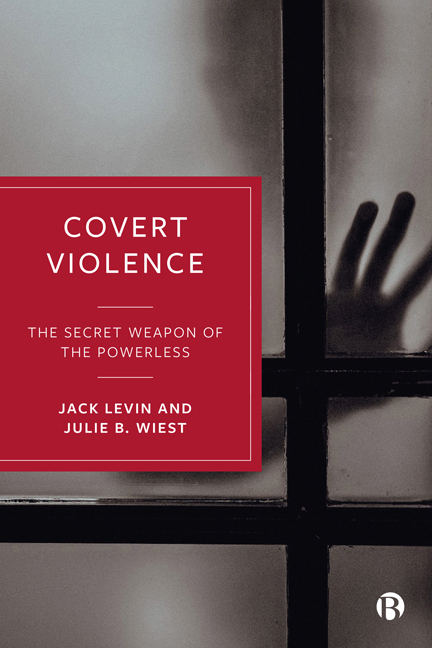Book contents
- Frontmatter
- Contents
- List of Figures and Tables
- About the Author
- Acknowledgments
- 1 An Introduction to Covert Violence, Power, and Social Institutions
- 2 Family and Close Relationships
- 3 Formal Education
- 4 The Workplace
- 5 Politics and Government
- 6 Healthcare
- 7 Mass Media
- 8 Shining Light on the Shadows
- Appendix: Case Summaries
- Index
5 - Politics and Government
Published online by Cambridge University Press: 03 April 2024
- Frontmatter
- Contents
- List of Figures and Tables
- About the Author
- Acknowledgments
- 1 An Introduction to Covert Violence, Power, and Social Institutions
- 2 Family and Close Relationships
- 3 Formal Education
- 4 The Workplace
- 5 Politics and Government
- 6 Healthcare
- 7 Mass Media
- 8 Shining Light on the Shadows
- Appendix: Case Summaries
- Index
Summary
Covert violence has always played an important role in supplementing conventional warfare. In 2016, for example, British special forces waged covert military operations in Yemen, Syria, Iraq, and Libya (Curtis and Kennard, 2019). However, two days after the U.K. Secretary of State for Defence stated that there were no plans to deploy troops to the Middle East, reports surfaced that British troops had secretly blown up an Islamic State vehicle carrying large amounts of explosives. Clandestine attacks by weaker operatives have also occurred, with devastating consequences in the United States, a country widely known for its military might. The most infamous examples include the December 1941 bombing of Pearl Harbor by Japanese forces and the September 11, 2001 attacks perpetrated by al-Qaeda terrorists; each resulted in the loss of thousands of American lives, many more injuries, and massive destruction of property.
Moreover, biological warfare has a centuries-long history around the world, as well as in the United States, such as the British colonists’ deliberate distribution of smallpox-infected blankets to Native Americans in the 1760s (Frischknecht, 2003). In modern U.S. history, the worst bio-terrorism attack—in terms of number of victims—occurred nearly 40 years ago in Oregon under highly unusual circumstances. In the early 1980s, several hundred followers of the Bhagwan Shree Rajneesh, the Indian spiritual leader who founded the Rajneesh movement, established a compound in northern Oregon, about an hour east of Portland. The Rajneeshees, as the followers were known, unnerved the residents of nearby Antelope (which has maintained a population under 100 since the 1940 Census). At first, it was because they all wore the same red clothing, participated in communal chanting and meditation, and demonstrated other odd forms of behavior. Later, it was because they began to outnumber the longtime residents and take over local politics. In fact, the city of Antelope was briefly renamed Rajneesh, Oregon, around this time.
When the Rajneeshees decided to aim even higher politically, they set their sights on the county seat of the city of The Dalles. The outnumbered group tried various strategies to sway the 1984 county election in their favor, including bussing in thousands of homeless people from around the United States who promised to vote for the Rajneeshee candidates—until that move was blocked by an emergency rule for suspected voter fraud.
- Type
- Chapter
- Information
- Covert ViolenceThe Secret Weapon of the Powerless, pp. 74 - 89Publisher: Bristol University PressPrint publication year: 2023



